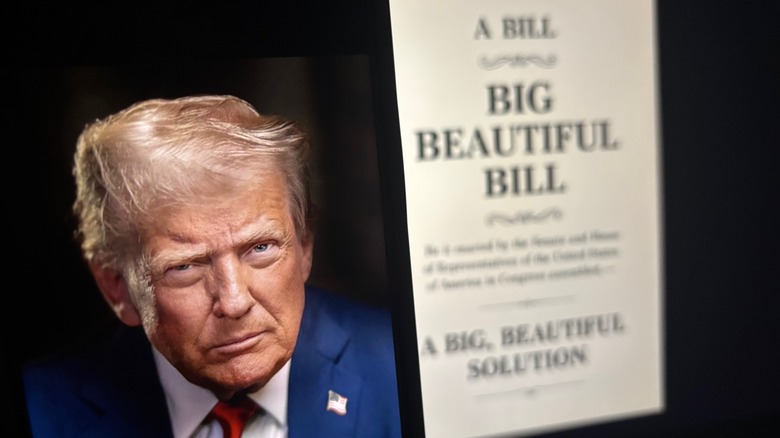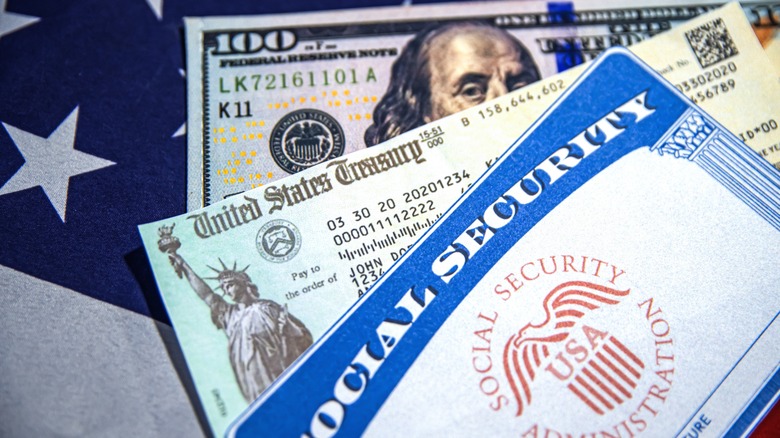The One Thing Social Security Got Wrong About The 'Big Beautiful Bill'
The One Big Beautiful Bill Act made income tax breaks from the 2017 Tax Cuts and Jobs Act permanent, secured an estate tax exemption for the wealthy, hiked the state and local tax (SALT) deduction from $10,000 to $40,000, created deductions for tips and overtime, and a host of other provisions. But what the new tax code pushed by President Donald Trump did not do is end federal income taxes on Social Security benefits.
On July 3rd, 2025, the Social Security Administration proclaimed in a press release and an e-mail sent to the public that OBBBA rids federal income taxes on Social Security payments for "nearly 90%" of beneficiaries. However, as Fortune pointed out, a provision that would have eliminated taxes on Social Security taxes was ultimately taken out by the U.S. Senate prior to passage.
So, why did the SSA make that claim? The OBBBA has a temporary extra income tax deduction of $6,000 for people over the age of 65 that can be applied for income tax filings for the years 2025 through 2028. This deduction can only be used in full for people filing as single who make below $75,000 or couples earning below $150,000. However, the Trump Administration asserts, this new deduction effectively eliminates federal income taxes on social security for 88% of its recipients. Still, some Social Security experts insist that the White House's claim is still misleading.
How Social Security payments are figured out and maybe taxed
For one thing, the new tax deduction does not apply to people on Social Security who are below the age of 62. For another, the deduction can also apply to people over the age of 65 who have yet to enroll in the Social Security program. Finally, as the Washington Post explained, most retirees aren't paying income tax on their SS checks anyway because they hardly receive any money outside of their monthly government benefits.
The Social Security Administration determines the size of your retirement payment based on when you retire and how much you've earned over a chunk of your life (what the SSA calls an average wage index). Full retirement age for those born after 1960 is currently 67, though those who wait until they are 70 years old will be entitled to receive more benefits. You can retire as early as age 62, but then you risk seeing your SS payments reduced by up to 30%. The government then figures out your benefits by averaging out your 35 highest earning years. The higher the average, the higher your potential income.
Those Social Security payments aren't taxed by the federal government unless a person filing as single earns additional income above $25,000 a year, or $32,000 a year for couples filing a joint return, a report from Fidelity explains. For those who earn between $25,000 and $34,000 ($32,000 to $44,000 for couples), up to 50% of their benefits may taxed. Above those amounts, the maximum tax for a Social Security is 85%.
Social Security might be headed for trouble
Still, other than perhaps the increased SALT deduction, the new law will not stop states from charging taxes on Social Security income. As of this year, nine states—Colorado, Connecticut, Minnesota, Montana, New Mexico, Rhode Island, Utah, Vermont, and West Virginia—still charges a tax on some Social Security benefits. By 2026, that number will be whittled down to eight when West Virginia stops taxing Social Security payments in 2026.
Unfortunately, the Committee for a Responsible Federal Budget, a nonpartisan organization that advocates for a balanced federal budget, warned that OBBBA's tax cuts could bankrupt the multibillion-dollar government trust funds for Social Security and Medicare by 2032 as the federal deficit balloons to more than $3.5 trillion. When that happens, Social Security incomes could be reduced by 24% while payments to Medicare's Hospital Insurance Trust Fund drops by 11%, the Committee said.
And as another Fortune article explained, the health care benefits Medicare provides to the elderly, poor, and disabled will be slashed severely with the passage of the OBBBA. And with those cuts will come more work requirements for adults on Medicare and an end to subsidies for citizens receiving health insurance through the Affordable Care Act.


